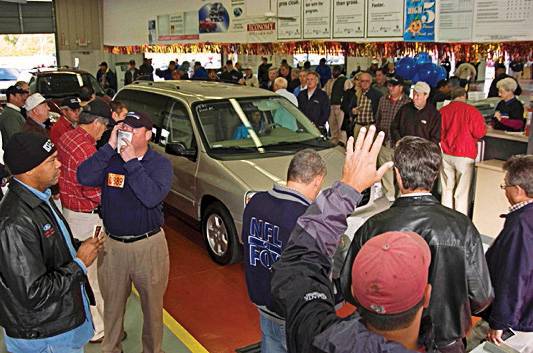
Courtesy of manheim
Cars cycle through a bidding area on auction day. The number of repossessed vehicles is up 12 percent nationwide this year, according to an executive of Manheim, which runs the auction shown here.
Wednesday, Dec. 10, 2008 | 2 a.m.
Beyond the Sun
Scenes of the recession have sprung up throughout the Las Vegas Valley, with closed storefronts and repossessed homes with their browning lawns.
But no scene is quite like the one out in the desert, 14 miles from downtown Las Vegas: a growing pool of cars, pickup trucks, vans and SUVs — 15,000 or so at last count — awaiting sale at auction.
There are repossessed sports cars; unsold inventory from dealerships; luxury vehicles with expired leases, and vanilla sedans no longer needed by car rental companies because of slumping tourism.
They are parked in a kind of limbo alongside Interstate 15, some at Las Vegas Motor Speedway but most in the open desert across the freeway.
The vehicles are most likely destined to be sold at the Greater Nevada Auto Auction, operated by Manheim, a wholesale auction company.
Even in a healthy economy, used vehicles cycle through auction houses for resale. In bad economic times, when people struggle to make purchase or lease payments, even more find their way here, says Ira Silver, the chief economist for the National Auto Auction Association.
And the bad economy means they will take longer to sell.
A year ago, vehicles turned around at auction within 25 to 30 days of arriving. Today, the average wait time is about 45 days. Still, auction vehicles are moving more briskly than new and used vehicles at dealerships and car lots in town.
Another reason for the lag time in selling cars at auction has to do with the laborious repossession process, says Meredith Libbey, a spokeswoman with Ford Motor Credit.
Even though the company has repossessed or surrendered vehicles towed directly to the auction yard, it must wait 10 days before it can sell the vehicles. Ford Motor Credit would rather work out an arrangement with delinquent drivers to catch up on their payments than to sell the car at auction, Libbey says.
If a deal cannot be struck and the vehicle is at a Manheim lot, it will be peddled at the company’s weekly auction. At the Greater Nevada lot, between 1,000 and 1,500 representatives of dealerships and other wholesalers attend the weekly auctions. The sessions, which are closed to the public, offer vehicles of all sorts, whereas Southern California lots specialize in higher-end cars and a Denver lot features four-wheel drives.
Ford rarely declines the highest bid at auction, Libbey says. “The goal is to sell the vehicle and move on. You’re not (likely) better off if you wait another week.”
Manheim won’t specify how many repossessed vehicles are at its Las Vegas lot, but the rate of repossessions nationally is mounting. For every 100,000 outstanding indirect loans, 164 defaulted in the second quarter of 2007. That rate jumped to 233 the second quarter of this year, according to the American Bankers Association.
The number of repossessed vehicles nationally is up 12 percent this year, says Tom Webb, Manheim’s chief economist.
So more vehicles are finding their way to auction lots.
And those storage lots keep getting bigger. Two years ago, Manheim outgrew its lot on the south end of the valley and moved to its site across from the speedway. But even that won’t be large enough. Manheim is adding 20 acres to its facility, says Bob Burke, the assistant manager of Manheim’s Greater Nevada lot.
This is economic growth of a different sort.

Join the Discussion:
Check this out for a full explanation of our conversion to the LiveFyre commenting system and instructions on how to sign up for an account.
Full comments policy